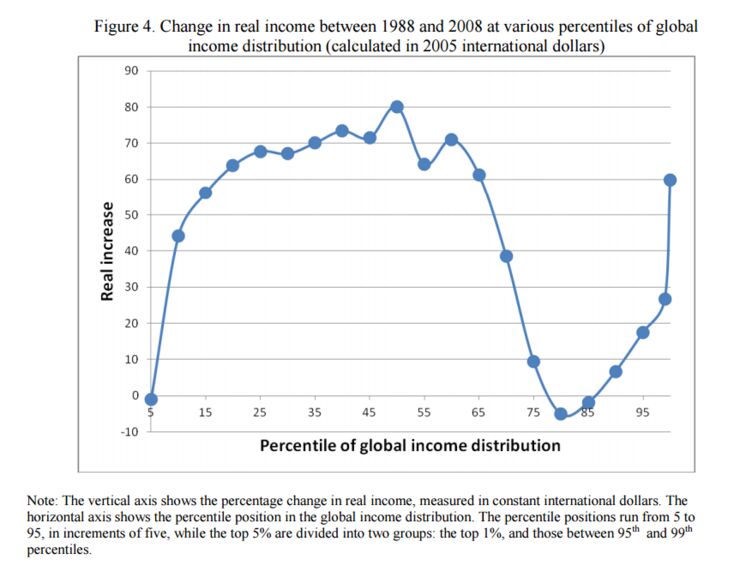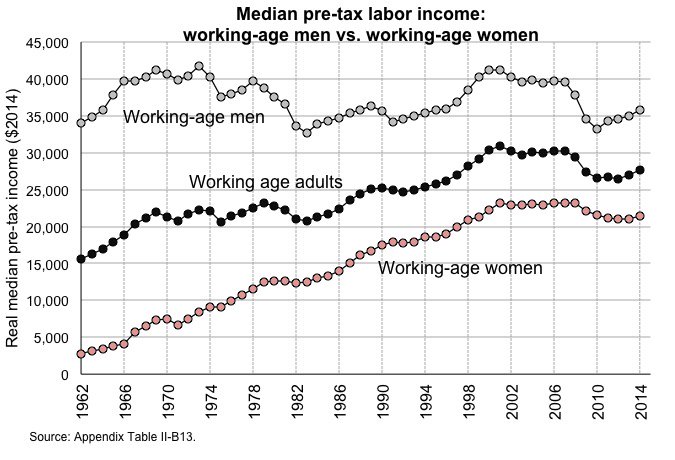This blogpost is in response to a flurry of articles announcing that The American Dream is over. Why? Because fewer people are making more money than their parents did. Is making more money than your Americans the only thing Americans dream about?
There are very serious things happening in the USA and the world which have me very worried. But what scares me is more political than economic. I fear the dismantling of the institutions of American government set up to protect minorities and other disadvantaged people. This dismantling is also being driven partly by fear. There's no single narrative behind the binary forced decisions that gave us Trump and Brexit, many people voted and for many reasons. But this particular post addresses just one: mistaking the rise in both local and global egalitarianism for a collapse of the fortunes of whites, males, or especially white males.
Is there a rise in egalitarianism? Well, in many ways yes, except at the very extreme of the economy.
Have a look at Branko Milanovic's "elephant chart". On the one hand you can see why there's been an incredible plummet in the number of people who suffer extreme poverty worldwide. But the chart is slightly distorted by the fact it emphasises relative gain, and has very little information on the the very richest people. Inequality in the OECD is increasing partly because the world is getting fairer, and partly because the richest people live here.
Look: the world being fairer does necessarily mean that white American men have less relative advantage over others, and the same to a weaker extent for white females and and non-white males more generally. The formerly ethnically privileged are no longer born with a guaranteed high wage at unskilled labour even if they drop out of high school. But that doesn't mean their lives are absolutely worse. And it does mean that a lot of other people's lives can get better.
Relative wealth means power over others, so you might think "can anything else matter?" The answer is sure, lots of things matter. Think about it. Would you rather be Henry VIII with all the wealth of a king in the 16thC, or would you rather have hot showers, antibiotics, Thai food, and the Internet? (Not to mention access to fertility treatments.) I spent last night at a reception in a mansion where the head of the house had just lost his wife and the mother of their young children to cancer. I know he would give up quite a lot to have her back. Power and wealth are not everything.
But power does matter and wealth inequality is making it easier for people to create mayhem by spreading ideas that are patently not about the world, but just about identity – about which people you are backing in the enormous global horserace between "influencers".
So my point is that when you see Gabriel Zucman's gendered income graph you shouldn't panic and say "Women's wages are going up but men's aren't!!!" You should say "Wages have stagnated but at least women's are approaching men's, though they seem to be asymptoting below men's hmmm that's bad too."
And when you see the headline-grabbing around European-American life expectancy declining while African-American life expectancy is still rising, you could if you like panic about what terrible scourge is attacking only whites, or you could notice that blacks still have a way higher mortality rate than whites do and think "well, I guess it's good that what race you are matters less than it used to in determining your health, but what can we do to help the healthcare or reduce the stress of all non-college-educated folks? And hey, can whatever's working for Hispanics help the others?"
So I put to you that this New York Times article should not be titled:
What do Europeans do differently? Well, for one thing they are investing in social welfare more like we used to in the 1950s-1970s. That is, the happiest country in the world has tax rates more like ours were back when our wages tracked our productivity. That period of wages tracking productivity was a weird exception historically, incidentally, but one when political polarisation and wealth inequality were both low. Coincidence?
I think not. In fact, I think this article should have been titled
There are very serious things happening in the USA and the world which have me very worried. But what scares me is more political than economic. I fear the dismantling of the institutions of American government set up to protect minorities and other disadvantaged people. This dismantling is also being driven partly by fear. There's no single narrative behind the binary forced decisions that gave us Trump and Brexit, many people voted and for many reasons. But this particular post addresses just one: mistaking the rise in both local and global egalitarianism for a collapse of the fortunes of whites, males, or especially white males.
Is there a rise in egalitarianism? Well, in many ways yes, except at the very extreme of the economy.
 |
| Branko Milanovic's "elephant chart" |
Look: the world being fairer does necessarily mean that white American men have less relative advantage over others, and the same to a weaker extent for white females and and non-white males more generally. The formerly ethnically privileged are no longer born with a guaranteed high wage at unskilled labour even if they drop out of high school. But that doesn't mean their lives are absolutely worse. And it does mean that a lot of other people's lives can get better.
Relative wealth means power over others, so you might think "can anything else matter?" The answer is sure, lots of things matter. Think about it. Would you rather be Henry VIII with all the wealth of a king in the 16thC, or would you rather have hot showers, antibiotics, Thai food, and the Internet? (Not to mention access to fertility treatments.) I spent last night at a reception in a mansion where the head of the house had just lost his wife and the mother of their young children to cancer. I know he would give up quite a lot to have her back. Power and wealth are not everything.
 |
| Gabriel Zucman's gendered US income graph |
So my point is that when you see Gabriel Zucman's gendered income graph you shouldn't panic and say "Women's wages are going up but men's aren't!!!" You should say "Wages have stagnated but at least women's are approaching men's, though they seem to be asymptoting below men's hmmm that's bad too."
 |
| The graph Case & Deaton (2015) didn't quite show you |
So I put to you that this New York Times article should not be titled:
The American Dream, Quantified at Last
And it certainly shouldn't have had Chetty's Academic title,The Fading American Dream
Yes, it shows that it's harder to make more money than your parents did now than it used to be. But what does that money denominate? We probably also have smaller homes and longer commutes than our parents, because there's more people on the same sized planet. But we might do better to focus on reliable, sustainable indicators of well being—like the health of infants (what percentage of babies born survive to childhood – this is the leading indicator of the stability of a country), or social mobility (can you get ahead even if you were born behind?) Incidentally, Europe is leading the US on both of those indicators. Also, the euro zone passed the dollar zone as the world's leading economy in 2007. So one thing Americans might want to dream about is living at least as well as Europeans do.What do Europeans do differently? Well, for one thing they are investing in social welfare more like we used to in the 1950s-1970s. That is, the happiest country in the world has tax rates more like ours were back when our wages tracked our productivity. That period of wages tracking productivity was a weird exception historically, incidentally, but one when political polarisation and wealth inequality were both low. Coincidence?
I think not. In fact, I think this article should have been titled
We like it better when we have less inequality, so let's go back to the tax & redistribution regime of the 1950-1970s
and the figure out of it that everyone on twitter ought to be highlighting is this one:
This really very much matters. Because one of the things that happens when you have high income inequality and political polarisation seems to be WWI – wealthy global emperors motivating armies to attack each other over flag waving rather than any substantiated truths. More on that in a near-future blogpost.
[Er, I still haven't written that particular blogpost about individuals becoming powerful (as 2020, or 2023, though the paper related to it (and polarisation and inequality) finally came out) but here's one about ideas as flags not facts.]
[Er, I still haven't written that particular blogpost about individuals becoming powerful (as 2020, or 2023, though the paper related to it (and polarisation and inequality) finally came out) but here's one about ideas as flags not facts.]
Correction Oct 2020 – can't believe I didn't link the Washington Post article that I took the third figure from (though to be fair it doesn't make the point I was making, it is more in line with Case & Deaton). Thanks to John Muyskens (the figure's author) for digging it out for me!

Comments